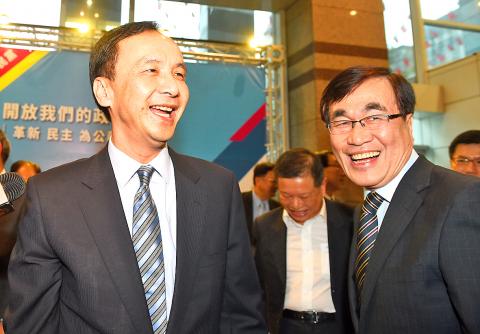Chinese Nationalist Party (KMT) Chairman Eric Chu’s (朱立倫) description of cross-strait relations as two sides “belonging to one China” risked leading to a “misunderstanding” that Taiwan belongs to the People’s Republic of China (PRC), Mainland Affairs Council Minister Andrew Hsia (夏立言) said in Taipei yesterday.
There is a subtle difference between that description and the so-called “1992 consensus” adopted by the government, under which both sides of the Taiwan Strait recognize that there is ‘“one China,” with each side having its own interpretation of what “China” means, Hsia told a meeting of the legislature’s Internal Administration Committee in Taipei.
The government has tried to avoid using the language Chu used because of political sensitivities and has opposed the formula whenever the Chinese mention it, Hsia said.

Photo: Chien Jung-fong, Taipei Times
“We consider it unacceptable. That position remains unchanged,” he said. “We would not choose to use of words he [Chu] did.”
However, Hsia commended Chu’s characterization of the “1992 consensus,” saying that Chu intended to highlight the importance of the consensus — although he used a different way to express it.
“If the ‘one China’ he [Chu] meant was the Republic of China [ROC], as he said it was, of course I am not opposed to the idea,” Hsia said.
Hsia was invited to the meeting to take legislators’ questions over Chu’s just-concluded trip to China, where he met Chinese President Xi Jinping (習近平) and attended the 10th Cross-Strait Economic, Trade and Culture Forum cohosted by the KMT and the Chinese Communist Party (CCP).
Chu’s statement that “both sides [of the Taiwan Strait] belong to ‘one China,’ with differences in connotations and definitions [of ‘one China’]” was at the center of the sometimes heated debate.
Hsia did not voice his opinion about Chu’s definition of the “1992 consensus” until he was grilled by legislators from the Democratic Progressive Party (DPP), the Taiwan Solidarity Union and the People First Party — one after another — about whether the government had shifted its position from the “1992 consensus,” or what it said was “one China, with each side having its own interpretation of what ‘China’ means” to “both sides belonging to ‘one China.’”
In the beginning, Hsia said the phrasing of “both sides belonging to ‘one China,’” was similar to the “1992 consensus” of “one China, with each side having its own interpretation of what ‘China’ means.”
Hsia said Chu was the first person in the ROC to describe cross-strait relations as being “two sides belonging to one China,” a term coined by Beijing and commonly used by Chinese officials — most recently by Xi in March.
He was then corrected by DPP Legislator Lee Chun-yi (李俊俋), who said former KMT chairmen Wu Poh-hsiung (吳伯雄) and Lien Chan (連戰) had both proposed the idea before.
The statement made by former Mainland Affairs Council minister Wang Yu-chi (王郁琦) in March 2013, in response to then-Chinese vice premier Li Keqiang (李克強), who said both sides belong to “one China,” that the characterization was “unacceptable” remains valid, Hsia said.

Taiwan is projected to lose a working-age population of about 6.67 million people in two waves of retirement in the coming years, as the nation confronts accelerating demographic decline and a shortage of younger workers to take their place, the Ministry of the Interior said. Taiwan experienced its largest baby boom between 1958 and 1966, when the population grew by 3.78 million, followed by a second surge of 2.89 million between 1976 and 1982, ministry data showed. In 2023, the first of those baby boom generations — those born in the late 1950s and early 1960s — began to enter retirement, triggering

ECONOMIC BOOST: Should the more than 23 million people eligible for the NT$10,000 handouts spend them the same way as in 2023, GDP could rise 0.5 percent, an official said Universal cash handouts of NT$10,000 (US$330) are to be disbursed late next month at the earliest — including to permanent residents and foreign residents married to Taiwanese — pending legislative approval, the Ministry of Finance said yesterday. The Executive Yuan yesterday approved the Special Act for Strengthening Economic, Social and National Security Resilience in Response to International Circumstances (因應國際情勢強化經濟社會及民生國安韌性特別條例). The NT$550 billion special budget includes NT$236 billion for the cash handouts, plus an additional NT$20 billion set aside as reserve funds, expected to be used to support industries. Handouts might begin one month after the bill is promulgated and would be completed within

NO CHANGE: The TRA makes clear that the US does not consider the status of Taiwan to have been determined by WWII-era documents, a former AIT deputy director said The American Institute in Taiwan’s (AIT) comments that World War-II era documents do not determine Taiwan’s political status accurately conveyed the US’ stance, the US Department of State said. An AIT spokesperson on Saturday said that a Chinese official mischaracterized World War II-era documents as stating that Taiwan was ceded to the China. The remarks from the US’ de facto embassy in Taiwan drew criticism from the Ma Ying-jeou Foundation, whose director said the comments put Taiwan in danger. The Chinese-language United Daily News yesterday reported that a US State Department spokesperson confirmed the AIT’s position. They added that the US would continue to

IMPORTANT BACKER: China seeks to expel US influence from the Indo-Pacific region and supplant Washington as the global leader, MAC Minister Chiu Chui-cheng said China is preparing for war to seize Taiwan, Mainland Affairs Council (MAC) Minister Chiu Chui-cheng (邱垂正) said in Washington on Friday, warning that Taiwan’s fall would trigger a regional “domino effect” endangering US security. In a speech titled “Maintaining the Peaceful and Stable Status Quo Across the Taiwan Strait is in Line with the Shared Interests of Taiwan and the United States,” Chiu said Taiwan’s strategic importance is “closely tied” to US interests. Geopolitically, Taiwan sits in a “core position” in the first island chain — an arc stretching from Japan, through Taiwan and the Philippines, to Borneo, which is shared by